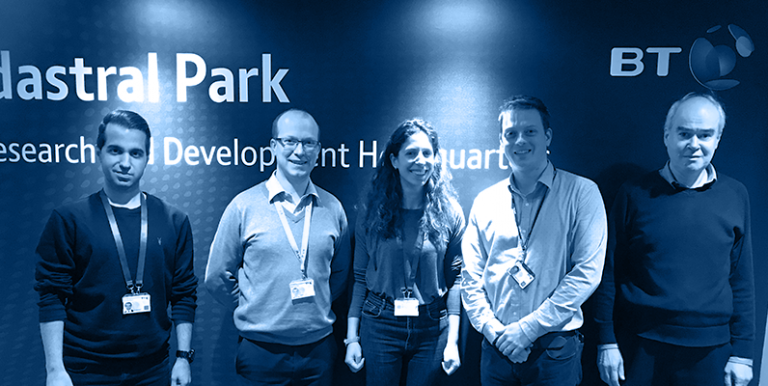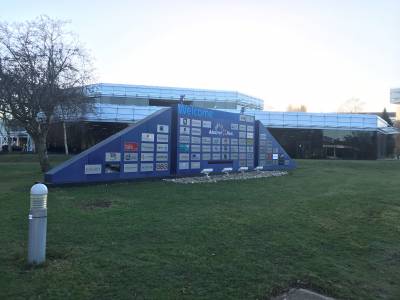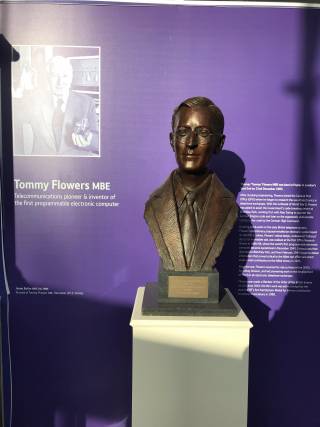FEATURE: An ICCS member's experience at the heart of BT's Innovation Labs
15 January 2019
Hedaia Ghannam, PhD student and member of ICCS, describes her internship with leading telecom provider British Telecom.

Author Hedaia Ghannam, PhD Student
 Innovation | 5G | Internet of Things | BT | Industry
Innovation | 5G | Internet of Things | BT | Industry
Recently I had the great opportunity to submerse myself in a collaborative internship from the Institute of Communications and Connected Systems (ICCS) to British Telecom (BT) leading to multiple benefits on myself, ICCS and BT.
BT is the largest provider of fixed-line, mobile and broadband services in the UK, also providing subscription television and IT services. The organisation is a world pioneer in innovation within the field communication technology. The company is a long term collaborator of UCL.
Through ICCS I was awarded the internship which was made possible by Engineering and Physical Sciences Research Council (EPSRC) funding, through UCL Innovation and Enterprise, and financial support from British Telecom.

Beginning my internship in August 2018 I joined the Wireless Research Team at BT's Global Research and Development Headquarters, BT Labs, at Adastral Park in Ipswich. In the first couple of weeks, the team manager, Dr Michel Fitch, organised various meetings with the different teams to introduce me to the varied array of ongoing projects and the current pressing topics for the communications industry. These included Internet of Things (IoT), network slicing, machine learning, mmWave communication, superfast DSL (broadband down the telephone line or specially installed cables) and 5G & beyond mobile communication technologies
While learning from about the industrial viewpoint of communications technologies I was also provided with the opportunity to present my PhD research to the whole team in which I explained the proposed techniques I have been exploring in my academic studies. Responding to my new understanding of the industry and the BT team's interest in my research a discussion between Dr Anvar Tuckmanov, Senior engineer at BT, my PhD supervisor Professor Izzat Darwazeh and myself provided a project outline for the internship.
Ensuring the internship was of benefit to my ongoing studies the project was directly related to the research topic of my PhD thesis.
The aim of the project was to explore new methods of improving the spectral efficiency of future communication links and networks. This explored new signal formats and transmission techniques for radio waves that would be compatible with 5th generation mobile systems (5G).
The proposed work built upon research undertaken by my research group at UCL for 4G and satellite applications, areas I have explored throughout my PhD.
The method we proposed and which I worked upon with BT allows increased data rates over radio waves using the same frequency range. This allows greater tranfer rates, improves users experiences and reduces the cost of data transmission per Gbit.

To achieve this improvement I used a radio wave format that differs from conventional 4G signals and those proposed for 5G. Known as a non-orthogonal signal forma this waveform violated the orthogonality of the signals to save bandwidth, meaning that we deliberately allowed signals to interfere with each other in a known manner.
The radio wave format explored is termed Spectrally Efficient Frequency Division Multiplexing (SEFDM) and has been developed at UCL and researcher over the past 15 years and has shown huge potential to increase the efficiency of wireless communication compared to conventional radio wave formats.
Exploring the application of my ideas in practical future communication systems has had a positive impact on my research and allowed me to view the use of SEFDM and the larger system from different perspectives. Furthermore, I am excited that the collaboration with a leading communication organisation like BT will help SEFDM move closer towards standardisation and testing in commercial environments.
One of the aims after this internship was to develop further collaborations based on the work achieved during the internship, we are now developing funding proposals to support this. This will be supported by joint publicity and research publications that will impact both UCL and BT research and give the work exposure beyond the usual academic channels.
All together my internship at BT was a great experience with huge benefits to myself, along with ICCS and BT.
Further information on the signal format Spectrally Efficient Division Multiplexing (SEFDM) developed at UCL can be found within the paper 'The First 15 Years of SEFDM: A Brief Survey'.
Funding from UCL Innovation and Enterprise (I&E) was through an Engineering and Physical Science Council Impact Acceleration Award, further details on this funding can be found at the I&E funding website.
ICCS is always looking for new opportunities to collaborate if you would like to explore opportunities for research collaboration, internships, technical consultancy or any other type of engagement please get in touch.
 Close
Close

